| the annual political rant (skip to the next section to bypass if you so wish) |
|
| |
"What is the cost of lies? It's not that we'll mistake them for the truth. The real danger is that if we hear enough lies, then we no longer recognize the truth at all. What can we do then? What else is left but to abandon even the hope of truth and content ourselves instead with stories? In these stories, it doesn't matter who the heroes are. All we want to know is, who is to blame?" |
One thing people who run media-orientated websites and YouTube channels usually try to do is avoid openly expressing political opinions. The reason is simple. They rely on ad revenue for their funding and that revenue is in turn reliant on the size of the site or channel’s viewership. Express a political opinion and part of that customer base will go scurrying away and your income will drop. As anyone who’s followed Cine Outsider for some time will know, that’s not how we roll. We carry no ads and make no money from the site (it actually costs me to run it) and our readership is relatively small. Let’s call it niche. Yeah, that works. We don’t do it for the dosh but for the love of the films and the enjoyment of writing about them. Obviously we hope that the reviews get read and enjoyed, but in the grand scheme of things it doesn’t make a huge difference whether they reach ten people or a thousand. It’s for this reason that we decided long ago that if a film has a socio-political element then we would address it and not sit on the fence about our opinions. We’ve made no secret of our views, and if you’ve stuck with us over the years I’m assuming that you’ve either learned to tolerate that aspect of our coverage or are sympathetic to it. It’s for that reason that I sometimes start my end-of-year round-ups with a rant about the current state of the nation. I can’t help it, it’s in my DNA. As someone who has witnessed at first hand the impact of ten years of austerity-driven cruelty, I’ll be damned if I’m going to just bottle that up. But this bloody year...
Given how horrified I’ve been by the devastating effects of government policies over the past decade (as an example, a study published in the British Medical Journal last year linked a staggering 120,000 deaths to the government’s austerity measures – imagine the public reaction if that number had been caused by terrorist attacks or a viral outbreak), I was always going to react with utter dismay to the election of a government so right-wing that it looks set to make the wretched, meat-faced David Cameron look like a closet liberal. We’ve already seen signs of likely authoritarianism to come, in the veiled threats to shut down TV channels that are critical of the government, in the manifesto pledge to rewire the constitution, in tucked-away plans to allow laws to be passed without parliamentary approval and others to protect the prime minister from prosecution for what would currently be classed as criminal acts. We now have a government whose key players I have no problem whatsoever labelling as corrupt sociopaths, people who care little about the suffering of others and who are looking to personally profit from measures that are set to have a serious impact on the general populace. I could go on at some length about the self-harm the country has chosen to inflict on itself, about how not a single concrete positive reason has yet been put forward for leaving the largest trading block in the world, or how the preparations for doing so, although woefully inadequate and poorly thought through, are akin to what a country would do in an attempt to mitigate the impact of a war or an approaching category 5 hurricane. It’s become abundantly clear that we’re all going to suffer (well, not the multi-millionaires, but the rest of us), yet nobody seems capable of giving a sound reason why without swiftly descending into vacuous sloganeering.
What has probably angered me the most about the past few months, however, is the complete disregard for truth and factual information that Johnson and his despicable cronies have displayed in the course of their excuse for electioneering and what it says about how this country is being shaped in Donald Trump’s image. Take a look again at that quote at the top. I deliberately didn’t attribute it because it could so easily be read as a reference to how the Tory election campaign was conducted. It’s actually the opening monologue of the HBO series Chernobyl, drawn from the diaries of nuclear physicist Valery Legasov and referencing how the effects of the Chernobyl disaster were worsened by the Soviet government’s relentless repression of the truth in favour of manufactured propaganda. A tad ironic, then, that the use of propagandist lies to undermine the truth on social media in the West has been revealed to be partly the work of Russian operatives under the direction of former KGB officer Vladimir Putin. We know for a fact that there was such interference in both the American presidential election and the referendum on whether Britain should leave the European Union (for more detailed information on both, see the Netflix documentary, The Great Hack – more on that below). Indeed, criminal activity was identified in the latter on the part of members of the Leave campaign, but the investigation has been brought to a standstill and no prosecutions have been made. Could the fact that some of those responsible are now part of the government that oversees our police force and its funding have anything to do with it? Hmm, let me stew on that for a few minutes. So seriously was this threat to our democracy taken that a cross-party investigation was conducted into Russian interference in recent elections and a report was produced outlining the committee’s findings. Yet despite being cleared for publication it was immediately suppressed by those who had likely benefited from this meddling (the fact that the most prominent of them received a sizeable sum from a Russian donor shortly after the decision to sit on the report is, shall we say, a suspicious development). We can’t have people knowing the truth about how elections are being manipulated by propaganda just before an election is to be manipulated by propaganda, can we? Even now, Johnson refuses to publish the report. The smart money says that should it ever appear it will be heavily redacted, even though it has already received full security clearance.
But here we are in early January 2020 and while these introductory rants are nothing new, when it comes to talking about misinformation and lies in modern politics, I’ve got a lot to say, some of which is informed by my own media experience. And while this is primarily a film and disc review site, it’s one with an undisguised political bias and at present is the only written outlet I currently have for my ever-growing sense of outrage at what is unfolding around me. But this is supposed to be a (late, as ever) end-of-year piece in which I pick a few favourite films and discs from the past twelve months, and I just know that once I get going (believe me, the above is small fry) I’ll be five pages in before a single film gets mentioned. I’ve thus elected to cut and paste much of what I had started writing into a seperate document with the aim of completing it later this week and posting it as a blog. That way, if the politics somehow doesn’t interest you (come on!) then you won’t have to navigate past it to get to the bit you came for. Actually, you've already had to do that. Sorry. This blog may well be the first such moan of many in the upcoming year, and while political in nature, it will ask questions about how we interpret what we watch on the range of screens through which we now consume media, as well how the documentary format might be affected – or hopefully be reinvigorated – by this current worldwide assault on factual information and truth.
So for the rest of this piece I’ll stick to the main brief, but if you are interested in my observations on the politics of truth and its impact on democracy and media, keep an eye out for the upcoming blog, which I’ll be posting soon. And yeah, what with the horrors that this government is gleefully threatening to unleash and the latest insanity across the pond, you can expect our discontent to continue to seep into our reviews when appropriate. To quote young Alice in Scorsese’s Alice Doesn’t Live Here Anymore, “anyone who doesn’t like it can blow it out their ass.” OK, let’s get down to business.
A common rule for drawing up an end-of-year list of personal favourite films is that the titles in question should have been released in UK cinemas in the preceding 12 months. I, as usual, have chosen to ignore this, although most of them probably do conform. I’ve explained before that I often do not catch films released in the final few months of the year because we screen them in the New Year at the cinema-based film society I co-run. We have to plan seasons several months in advance and access to newer titles for a single screening in a small provincial cinema is often not granted until they have exhausted their week-long metropolitan runs. This year, my mobility issues have restricted my access to even these films (I cannot sit in an average cinema seat for long before pain forces me to get up and hobble around on my crutches, which other patrons do tend to find just a little distracting), so have missed some that I am still catching up with through disc releases and streaming. Thus a whole string of potential candidates for this list will instead find themselves in consideration for next year’s pick, when I’ll doubtless be reeling out the same explanation again.
Perhaps the most frustrating casualty of this mix of circumstantial barriers was Mark Jenkin’s Bait, a film that attracted a sizeable audience at our film society and a slew of hugely positive reviews. It’s a film I just know I’m going to respond to positively but that was screened on an evening when my health took a bit of a nose-dive, forcing me to abandon my plans to pester audience members with my pacing about and creaky crutches. It’s released on Blu-ray by the BFI on 20 January, but I’m reluctant to hold this list up for another two weeks in the hope of surreptitiously including it. Expect to see it in consideration this time next year. Other titles I’ve been drawn to and have yet to see include Ad Astra, Birds of Passage, Border, High Life, The Last Black Man in San Francisco, Monos, Sorry We Missed You, Tigers are Not Afraid and a many more that I’ve not managed to catch out in the cultural sticks. I’ve since embarked on a catch-up binge, and some of these titles will doubtless find themselves on next year’s list as a result.
Although I’m in danger of repeating myself ad nauseum, it’s important to remember that this is a very personal selection and not some high-minded claptrap about the quality of movies that precious few of us who watch them could hope to create ourselves. To that end, I’m making no pompous claim that this is in any way a list of the year’s best films, merely a selection of titles that I saw for the first time and enjoyed during the course of the last twelve months, for a variety of often very different and personal reasons. As someone with a dislike of symmetry and round numbers, I have once again refused to confine my selection to five or ten or expand it to twenty, though I have little doubt that the list would have been longer had I been able to see more of the films on my sizeable watchlist. As ever, there are fair few that didn’t quite make the cut (there were a lot of films I liked, but considerably fewer that I really liked or loved) and a small number that have been championed elsewhere but that just didn’t click for me, one of which may – and I do mean may, as I’m not really into dissing movies that others enjoyed – be the subject of a future blog. I also find it nigh-on impossible to list films in order of preference (especially as that order almost always changes with subsequent viewings), so have plonked them in alphabetical order instead. Having said that, I did have a favourite this year, which I will identify when I discuss the film in question. Having given up on watching live TV broadcasts several years ago, the TV titles included were caught either on streaming services or Blu-ray, and I have decided to include one title that doesn’t conform to the usual criteria of being a film or TV series. You’ll know it when you get to it.
And so…
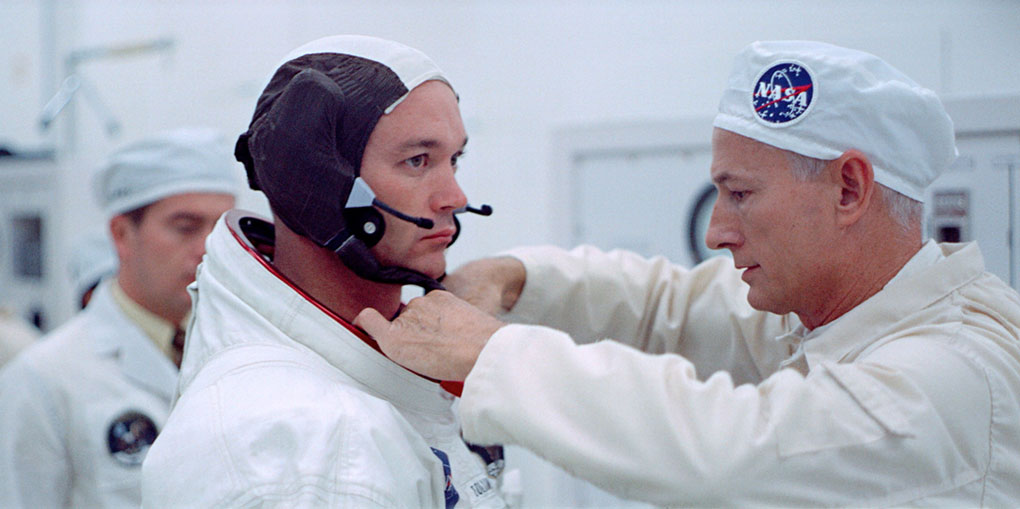
APOLLO 11
While saying little about NASA’s years of meticulous planning and preparation, this commentary-free record of the most historically and culturally significant mission of America’s space programme makes for utterly riveting viewing. Personal history plays a significant part here, as I was genuinely obsessed with everything related to the so-called Space Race as a child (and I was as bewitched by the Russian programme as I was by the American one) and still get a little misty-eyed at the sight of the Saturn V rocket and the Lunar Module, both of which I enthusiastically built model kits of in my youth. Director Todd Douglas Miller’s observational approach intermittently makes you feel as if you’re watching events unfold in real time, a sensation enhanced by some utterly gorgeous, never-seen-before 65mm footage of the Saturn V being moved to the launch pad, the astronauts readying themselves to board their craft, and the eager faces of members of the public who have gathered to watch the launch. The monumental nature of Miller’s task can be judged by the fact that this 93 minute film was edited down from a mind-boggling 11,000 hours of material.
Film review >>
ASH IS PUREST WHITE [JIANG HU ER NÜ]
I’ve been a fan of the cinema of Chinese filmmaker Jia Zhangke for some years, having been introduced to his work through the 2006 Still Life [San xia hao ren] and been subsequently seduced by The World [Shijie] (2004), 24 City [Er shi si cheng ji] (2008), A Touch of Sin [Tian zhu ding] (2013) and Mountains May Depart [Shan he gu ren] (2015). His latest, the enigmatically titled Ash is Purest White (I gather the actual translation of the Chinese title is ‘Sons and Daughters of Jianghu’), focusses almost exclusively on Qiao, the self-assured and respected girlfriend of provincial mob boss Bin, and how her life is completely reshaped by a single instinctive act to protect her man when he is assaulted by members of a rival gang. Unfolding over a six year period and revolving around the highs and lows of Qiao’s relationship with Bin, it sees Jia exploring some of his favourite themes to quietly compelling effect, and boasts a compelling central performance from Jia regular Zhao Tao as Qiao.
CHERNOBYL
Although some questions have been raised about the accuracy of some details and the (mis)representation of a couple of key characters, in all other respects this extraordinary series, which chronicles in detail the world’s worst nuclear reactor disaster to date, was the single most frightening thing I watched all year. Incisively written by Craig Mazin, whose previous work includes (and I did a double-take at this) Scary Movie 3 and 4 and the second and third instalment in The Hangover series, it’s grippingly and intelligently directed by Swedish music video maestro Johan Renck, who uses camera, editing, sound effects, music and utterly convincing CG to paint an unflinching picture of the accident and its consequences. Renck also respects the audience’s knowledge of the dangers of radiation and fallout to chillingly suggest with his camera what does not need to be said out loud to be understood. The cast is terrific, but I’ll give a special mention to Jared Harris as Institute Deputy Director Valery Legasov, Stellan Skarsgård as Council of Ministers Deputy Chairman Boris Shcherbina, Emily Watson as investigating nuclear physicist Ulana Khomyuk and – a personal favourite – Alex Ferns as take-no-crap mineworkers’ leader Andrei Glukhov.
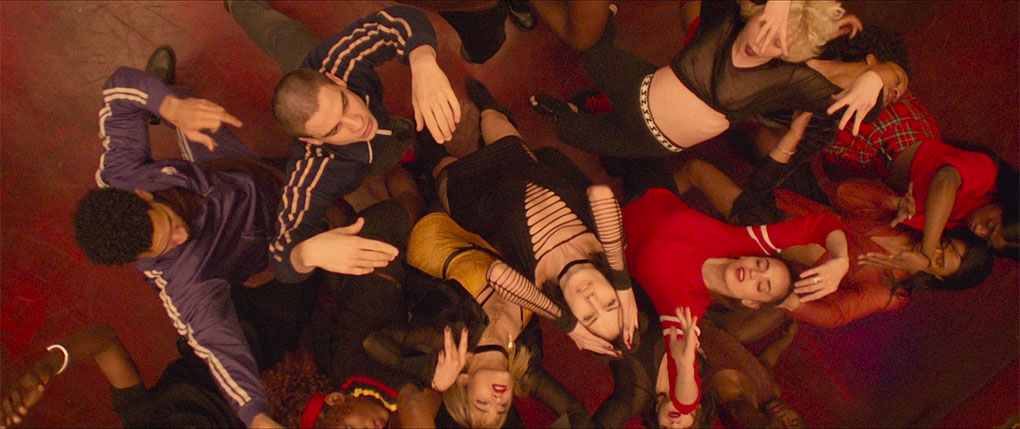
CLIMAX
Even as a long-standing fan of the work of French cinematic provocateur Gasper Noé, I was left shaken by his extraordinary latest, which I watched for the first time unaware of what was about to unfold. Opening with the best dance number you’ll probably see all year, the film hangs out with the performers as they converse and party, unaware that the sangria they’ve been drinking all evening has been spiked with LSD. As the drugs take hold and inhibitions crumble, the evening descends into a hellish moral and psychological pit of existential horror, which Noé’s disorientating lighting, sound design and ever-mobile camera prompt us to subjectively experience as well as observe. It’s a brain-battering assault on the senses that will likely prove too much for some, but if you’re game then it’s a cinematically thrilling and sometimes terrifying ride.
Blu-ray review >>
THE FAVOURITE
I’ll admit that I’m not usually one for period pieces and costume dramas and particularly tales of the foibles of royalty, but almost nothing about The Favourite plays to genre convention. The story of Queen Anne’s relationship with her close friend Lady Sarah and how this is disrupted by the arrival of new servant Abigail is based partially on factual accounts, which scriptwriters Deborah Davis and Tony McNamara and Dogtooth and The Lobster director Yorgos Lanthimos run with to sometimes delicious effect. Cinematically unconventional in its stylised use of extreme wides, low angles and fisheye lenses, it also boats a trio of superb lead performances from Olivia Colman as a childlike Anne, Rachel Weisz as the coolly manipulative Lady Sarah and Emma Stone as eager newcomer Abigail. Oh, and if you’ve somehow assumed that this might be a nice film to sit down and watch with that prim aunt who doesn’t like swearing or sex scenes in films, a small rethink might be in order.
Film review >>
THE GREAT HACK
Not the most revelatory or in-depth documentary, at least for those of us who followed the story that inspired it, Karim Amer and Jehane Noujaim’s exploration of how tech company Cambridge Analytica harvested Facebook user data to build profiles of voters and then bombard the ones they deemed to be “persuadables” with propagandist misinformation is still essential viewing. Although a little too focussed on the moral redemption of former Cambridge Analytica employee Brittany Kaiser, this does at least provide the film with an insider’s perspective, and the excellent investigative journalism of Guardian reporter Carole Cadwalladr, though not as prominently featured as it should be, does get welcome coverage here. Where the film does score is by economically summarising – assisted by fancy but genuinely effective graphics – just how vulnerable almost all of us are (my partner, who owns neither a computer nor a mobile phone, is effectively immune) to profiling by any agency that wants to profit from this user information, which we are informed has now surpassed oil as the world’s most valuable commodity. The film’s human moments are also noteworthy, particularly the reactions of a couple of the key participants to the televised testimonies of those at the centre of the scandal. For all its faults, this needs to be seen by everyone, not least because the Johnson government hired a similarly scummy firm to manage the social media misinformation barrage that ultimately landed him in number 10 on a flying carpet of lies. As Carole Cadwalladr passionately says in her TED Talk address to the tech giants that have enabled this corruption of democracy, “You set out to connect people and you are refusing to acknowledge that the same technology is now driving us apart. And what you don’t seem to understand is that this is bigger than you, and it’s bigger than any of us. And it is not about left or right, or leave or remain, or Trump or not. It’s about whether it’s actually possible to have a free and fair election ever again.”
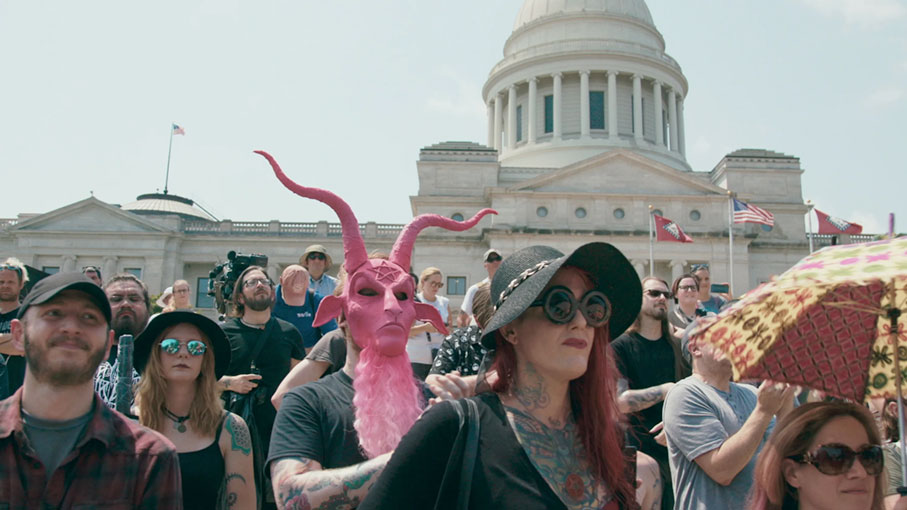
HAIL SATAN?
On paper, a documentary study of an American group named The Satanic Temple might sound like an exposé of the activities of a secretive and sinister collection of child-sacrificing Devil worshippers, and if that’s your expectation then you’re in for a surprise. As Penny Lane’s hugely enjoyable film seems to delight in revealing, the primary raison d’être of The Satanic Temple is to challenge traditional Christian doctrine and religious hypocrisy, which it does with unwavering wit and ingenuity. In interview, its members come across as likeable and free-spirited, and at a time when intolerant people still cite so-called Christian values to enforce distinctly un-Christian legislation, the fact that these people are so cheerfully willing to put themselves in the firing line (not a metaphor in a country with so many guns) gives me some hope for a more diverse and free-thinking future.
IN FABRIC
Peter Strickland is an intriguing filmmaker. I can genuinely appreciate why people would take a dislike his films, but I have to admit to being fascinated by them, so much so that even when one doesn’t click with me on the first viewing, as it was with The Duke of Burgundy, I’m irresistibly drawn back for a second viewing and always seem to find things that I missed first time around. I had no such reservations about his latest, In Fabric, an art-house horror about a haunted dress (you read that right) that also wittily satirises consumer culture in a manner that’s as integrated into the plot as it was in George Romero’s Dawn of the Dead. A bewitching other-worldly performance from Sidse Babett Knudsen as a gothic shop assistant who seems to have been transported from 19th Century Transylvania is balanced nicely by Marianne Jean-Baptiste’s naturalism as lonely single mother Sheila, who is talked into buying the dress in question and lives to regret it. Even when you think you can see where the film is heading, it does so with such gorgeously off-the-wall style that it’s always a treat to watch and listen to (Ari Wegner’s cinematography and the score by Cavern of Anti-Matter are both superb). Then, halfway through it does a rug-pull that seemingly resets the story whilst simultaneously continuing it, all of which feeds nicely into a neat final descent. It’s also intermittently (and unexpectedly) amusing and has the scariest household appliance this side of Requiem for a Dream.
THE IRISHMAN
One of a sprinkling of obvious choices here, but I approached this latest opus from Martin Scorsese as someone who has not been as excited as many others by his work of recent years, and for me this was the late career film I was waiting for him to make. Based on Charles Brandt’s intriguingly titled book, I Heard You Paint Houses, it tells the true story of how a chance encounter led to former serviceman and truck driver Frank Sheeran working for famed Teamsters’ union leader Jimmy Hoffa and becoming a hit man for the crime family led by Russell Bufalino. A key attraction here is the powerhouse cast, which includes Robert De Niro on top form as Sheeran, an impressively restrained Al Pacino as Hoffa and an uncharacteristically (but most effectively) low-key Joe Pesci as Russell Bufalino, as well as excellent support from the likes of Harvey Keitel, Ray Romano, Stephen Graham (can this man do no wrong?) and Jesse Pelmons. It is, as has been pointed out elsewhere, a very male movie but the tale is grippingly told, and while I do suspect it would really shine as a big screen experience (there was a limited cinema release), being a Netflix production meant that Scorsese and scriptwriter Steven Zaillian were able to tell the story at the length it really demanded without having to cut corners – it runs for three-and-a-half hours but somehow never feels overlong.
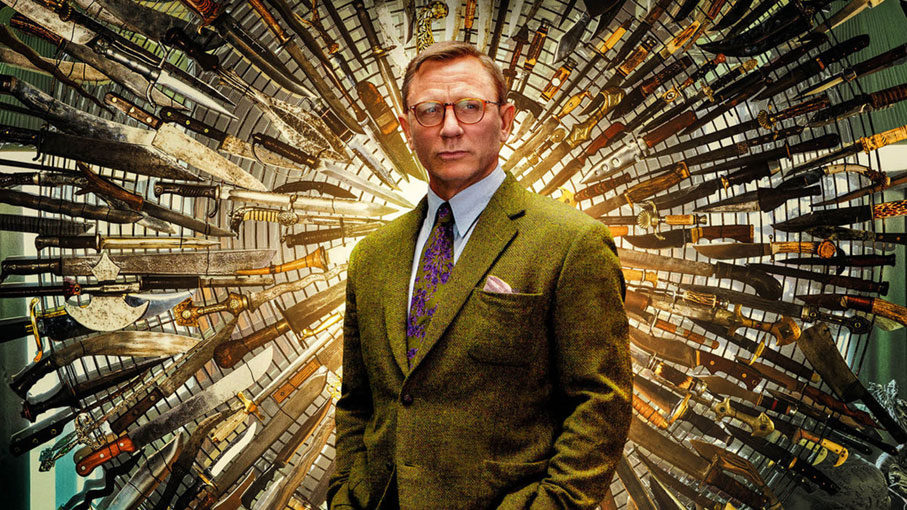
KNIVES OUT
I’ve a real soft spot for twisty Agatha Christie-esque murder mysteries and whodunnits, which some time ago found a comfortable home on TV. So imagine my guarded excitement at the news that the format had made its way back to the big screen and that the general response to it was one of delight, and for once I found myself in agreement with the mainstream consensus. It was written and directed by Rian Johnson, who tends to get remembered for The Last Jedi and Looper but who I still admire for his neo-noir debut feature Brick, a film whose offbeat smartness and detective story narrative feeds directly into this already more widely seen latest. When wealthy mystery writer Harlan Thrombey is found with his throat cut the morning after celebrating his eightieth birthday party with his family, the police are willing to rule it as suicide, but celebrated debonair private detective Benoit Blanc is hired by an unknown party to investigate the death as a possible murder. All the expected elements are here, with every one of Thrombey’s offspring saddled with a possible motive, but the film then throws a curve ball by seemingly revealing what actually happened before we even reach the halfway mark, which means there has more to it than one character’s recollections would suggest. But what exactly? A killer cast that includes Christopher Plummer, Daniel Craig, Chris Evans, Ana de Armas, Jamie Lee Curtis, Michael Shannon, Don Johnson and Toni Collette have a ball with material seemingly designed to allow them to do so, and the twists and reveals prove pleasingly satisfying. There’s also a rather nice socio-political subtext that almost feels like a surreptitious fuck-you to Trumpian anti-immigrant racism. Bravo.
Film review >>
MINDHUNTER [SEASON 2]
We’ve waited a long time for the second season of one of Netflix’s finest original shows, and the quality hasn’t dropped one iota. This time around executive producer David Fincher shares the director’s chair with Chopper and The Assassination of Jesse James by the Coward Robert Ford’s Andrew Dominik and Carl Franklin of One False Move and Devil in a Blue Dress fame, but once again the style and quality established up front by Fincher is maintained throughout. The lead trio of Jonathan Groff, Holt McCallany and Anna Torv are as impressive as ever, and the serial killer list this time includes creepily convincing turns by Oliver Cooper as David Berkowitz (aka Son of Sam) and Damon Herriman as Charles Manson. As far as I’m aware, a third season has yet to be commissioned, but I live in hope.
ONE CUT OF THE DEAD [KAMERA WO TOMERUNA!]
As someone who’s been really growing weary of the seemingly never-ending stream of zombie movies, I approached this microbudget Japanese indie from director Shin'ichirô Ueda with just a whiff of apprehension, despite some enticingly enthusiastic advance word-of-mouth. As the end credits rolled I stood up and applauded, the widest and happiest of smiles on my face. One Cut of the Dead is a film that you should go into as cold as possible for maximum effect, as the surprises it delivers in its joyous second half, when things that seemed a little odd earlier suddenly make complete sense, are all the more effective when you don’t realise that they’re coming. All you need to know about the story is that it involves the filming of a small independent zombie movie whose deserted factory location is invaded by real zombies (this happens early and is not a spoiler), but it’s how everything that happens later ties so perfectly and completely into events in the first half that makes this such an utter delight. Anyone who’s ever worked on a low-budget film will get a special kick out this, but the sheer ingenuity with which the plot and its connections and reveals are planned and executed are an absolute marvel. If I had to choose one film as my favourite of 2019, this would be it. There, now you know.

THE ROOM NEXT DOOR
This is a bit of a cheat given the title of this list, but with the nature of what we watch and how we watch it in a state of flux, I am for the first time going to include on my list a YouTube channel, or specifically one set of videos featured on it, for the simple reason that for they were the sharpest and funniest things I watched all year. The concept is simple. Michael Spicer, who I have to believe has a real future as a satirist, takes a real world car-crash interview or speech by a politician or public figure and intercuts it with footage of himself acting as a behind-the-scenes feed man, dismayingly responding to gaffs and giving urgent instructions on what to say next. The results are hilarious but also act as a glorious rebuke to the complete and utter bullshit that has been spouted recently by people in power. It’s no surprise that Boris Johnson is already a favourite subject, but I’d watch some of his earlier ones before sitting down for Spicer’s inspired response to Johnson’s hyperactive interview with Andrew Marr, as it benefits no end from the build-up.
YouTube channel >>
TELL ME WHO I AM
A Netflix distributed documentary that Netflix itself almost managed to fuck up for me with the automated warning captions that come up as the film starts about the content (at least on some devices), one of which effectively spoils a crucial later reveal. Thanks a lot, you dolts! So if you’re going to watch this on Netflix then close your eyes for the first twenty seconds and you should be fine. That aside, this is an extraordinarily (and yes, at times uncomfortably) intimate piece of film storytelling, stylistically straightforward but appropriately so, as this really is all about the two main interviewees, their stories and their emotional responses. The setup could almost be that of a fictional feature. A the age of 18, Alex Lewis was involved in a motorcycle accident that completely erased his memory, and from that point he was reliant on his twin brother Marcus – the only person he still recognised – to help him reclaim his identity and rediscover who he once was. Now in their fifties with families of their own, both men are interviewed about Alex’s rediscovery of the world and himself and the childhood he has lost. But there’s just one thing missing, something problematic that Marcus seems unwilling to discuss that is driving a wedge between him and Alex and that, over the course of the film, looks set to be finally revealed. And the moment, when it finally arrives, is the only time I’d shed a few tears when watching a film all year. It’s a deeply moving and sometimes heart-breaking experience. Don’t read about it first, just see it.
US
When your debut feature is as good and as culturally significant as Get Out, the downside is that you’re setting yourself up for a fall and a likely critical hammering with whatever you do as a follow-up. Not so Jordan Peele, who stuck with the genre he loves to deliver another biting socio-political horror story told from an African-American perspective. An initially mind-bending home invasion tale in which a holidaying middle-class family are confronted and tormented by a mirror family of sinister doppelgangers, what starts as a seemingly supernatural tale takes a science fiction/horror turn in its later stages, and builds to a chillingly apocalyptic finale. It inevitably lacks the “where did that come from?” impact of its pitch-perfect predecessor, but it’s still a hell of a second feature, though it does pile the pressure even further on Peele for whatever he decides to do next, at least as writer-director – his next project as writer only is a ‘spiritual sequel’ to the Clive Barker/Bernard Rose horror classic Candyman, directed by Crossing the Line’s Nia DaCosta. Colour me intrigued.
Unlike a couple of the above films, the entries on this list were all released in the UK in 2019, and once again there are a fair few others that should have been contenders but that fell victim to a variety of circumstances and life-imposed restrictions. I’ve watched many films on Blu-ray this year that I wasn’t able to make the required time to review, and I’ve not watched probably as many for the very same reason. Others I saw but was left unexcited by, and given how long we tend to spend on disc reviews and the fact that my free time is rationed, offered the choice between talking at length why I felt a film or disc was mediocre and singing the praises of one that I’d love everybody to see, I tend to plump for the latter.
Once again there has been an absolute slew of quality releases from the major independent labels we tend to favour, notably Eureka, Indicator, Arrow, Second Run, Second Sight, Dogwoof, Criterion UK and even Curzon Artificial Eye. It’s been pointed out to me that 88 Films also release the sort of titles that we’d normally cover, or at the very least announce the upcoming release of, but all attempts to contact the label have fallen on what I can only presume are disinterested ears. If we had more free time and more reviewers we’d take on everything we could, but with our ever-present restrictions we do tend to prioritise the Blu-rays that are sent to us unsolicited from the likes of Eureka, Indicator and Second Run. When a title really takes our fancy and we think we can squeeze it in, we do occasionally request review discs from Arrow and Second Sight, but the Arrow discs we pick tend to be crammed with often substantial special features and recently have been landing on my doorstep only a couple of days before the release date, which means that the reviews end up being posted later than planned. This is, of course, why there are fewer Arrow titles on this list than there would be if I’d been able to see more of them, but my funds are too limited for me to be able to buy everything from the label’s release slate that I fancy the look of. And I fancy the look of a lot of Arrow releases.
In recent years the time I was able to devote to reviews was severely impacted by caring for my mother when her health began to fade, and after she passed away I did speculate that I’d have more time to spend watching and reviewing discs. And theoretically I have, but that time has been subsequently impacted by my own health issues and those of my now almost housebound sister, and I have to admit that having more free time did also see me increase how much of it I was spending on other non-work (and non-film) related activities. Just occasionally, real life still gets in the way. I’m very aware, for instance, that a pledge I made to continue posting reviews when I shot off to Japan for a month mid-March was simply not kept, which I’m sure did not sit well with distributors who had sent us discs with this promise in mind. Ah, who was I kidding? I love Japan and I really, really needed that holiday. In the end I was simply having too much of a good time, and spent my late evenings drinking shochu and editing video footage of the day’s activities to send to my sister. Sometimes films just have to take second place.
As a final note, a couple of weeks ago I asked site regulars to feed back about the idea of us doing two tiers of review, adding shorter ones of titles that we didn’t have the time to cover at our usual length. Opinion was divided but leaned strongly in favour of this two-tier approach, but as I said at the time, whether we can pull it off is a whole different matter. Once we start writing...
Anyway, to the discs.
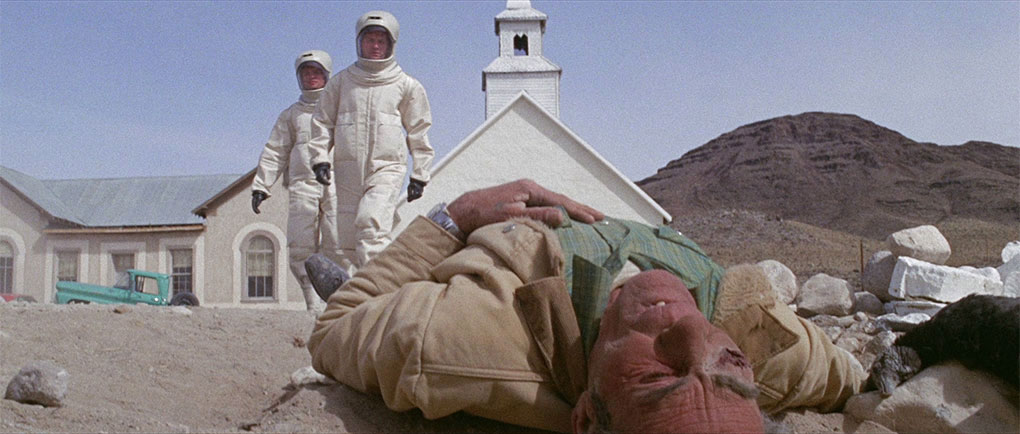
THE ANDROMEDA STRAIN (Arrow)
Absolutely full marks to Arrow for picking up what for me is one of the most undervalued science fiction films of the 1970s, director Robert Wise and screenwriter Nelson Gidding’s grippingly low key adaptation of Michael Crichton’s 1969 novel of the same name. The film focusses almost entirely on the efforts of the carefully (although in one case not carefully enough) selected group of scientific specialists to isolate and neutralise a lethal alien organism that has been inadvertently brought back to earth on a probe. Miraculously, this proves compelling where it theoretically should be academic and dry, while the long periods of dogged study that such an investigation would require in real life become key plot points here. A lovely transfer is backed by a strong set of extras, but it’s a long-standing genre favourite of mine and it’s on this list – as are a fair few others – as much for that fact as for the quality of the presentation. Now, how about The Forbin Project?
Blu-ray review >>
BLOODY TERROR: THE SHOCKING CINEMA OF NORMAN J. WARREN 1976-1987 (Indicator)
I’ve had to come to terms with the fact that when Indicator announces a new box set, I know I’m going to be spending at a good week or two on a single review, but this year the distributor has really outdone itself, as will become clear over the course of this list. This collection of five films by British low-budget horror specialist Norman J. Warren is special not just for introducing Warren’s work to an audience that may not have previously seen many of his movies (and that includes me), but for the quality of the transfers – despite sometimes imperfect source material – and an absolute slew of engaging special features. Best of all is Warren himself, a hugely likeable and infectiously energetic enthusiast for his craft, and it’s his involvement in so many of the included extras here that makes it such a comprehensive and compelling set. Indeed, so much is there here to digest that to avoid delaying the posting for another week, I ended up covering each of the films in the set as separate reviews.
Blu-ray review>>
DAWSON CITY: FROZEN TIME (Second Run)
As ever, Second Run have done a belting job this year releasing films that many of us had not even previously heard of let alone seen, and despite a promise I made to myself to the contrary, each seemed to land on my doormat just as I was midway through a huge box-set review (see above) or was travelling or dealing with personal issues. Thankfully, clydefro was able to step in to cover a number of the titles I would otherwise have missed (and frankly did a better job with each than I could have), but one that I did make the time to take on was Bill Morrison’s extraordinary documentary, Dawson City: Frozen Time. I was already a fan of Morrison’s work, having been left reeling by the audio-visual assault on the senses that was Decasia, and here he revisited that film’s fascination with decaying celluloid to tell the fascinating story of the Dawson City of the title through reels of film that were uncovered in 1978 and had been partially preserved in permafrost. The result is unlike any documentary I’ve ever seen, a riveting factual record that is also a considerable and genuinely thrilling artistic achievement, beautifully presented on Second Run’s Blu-ray and backed by a strong collection of special features.
Blu-ray review >>
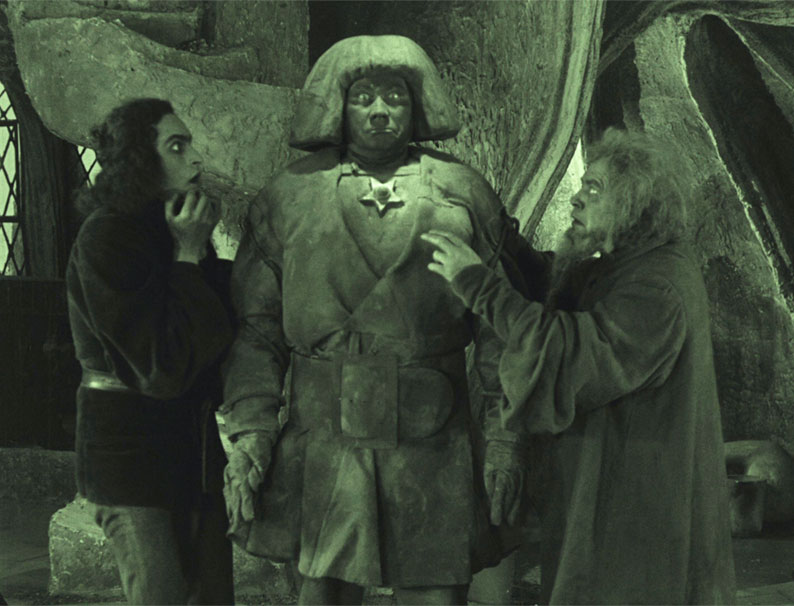
DER GOLEM (Eureka – Masters of Cinema)
This is one of several releases I’m still kicking myself for not covering, given how important and influential the film is to the development of the horror genre, not to mention how long I’ve been wanting to see what for years I was under the impression was a lost film, but which for decades had been languishing in the public domain in poor condition. This beautiful 4K restoration from the original negatives by Friedrich-Wilhelm-Murnau-Stiftung makes a mockery of the fact that the film was first released back in 1920, and it’s presented here with three very different music scores (by Stephen Horne, Wudec and Admir Shkurtaj), as well as an informative commentary by Scott Harrison, fascinating video essays by David Cairns and Jon Spira, the US cut of the film, a video piece highlighting the differences between the domestic and export negatives, and a collector’s booklet. So why was it not reviewed? Ah, this one’s a howler. It was sent to me and arrived on a particularly busy day, so I added it, unopened, to a small pile of white envelopes containing review discs with the intention of checking out the contents of the package later. Unfortunately in the bomb site that is my living room, the envelope somehow got transferred to a second pile containing discs that I knew I would not have time to review. Only as the end of the year approached did I discover that one of those envelopes was still sealed and that inside it was a Blu-ray review disc of a film I’ve been wanting to see since my teenage years. Idiot! Thus in the absence of a full review, know that the film is terrific and that the disc really does it justice, so comes highly recommended.
FULLER AT FOX: FIVE FILMS 1951-1957 (Eureka – Masters of Cinema)
When this five film Blu-ray box set of Samuel Fuller films was announced, I wrongly presumed it would just be an HD upgrade of Eureka’s earlier stand-alone DVD releases, quite forgetting that not all of the titles in the set were released on DVD by Eureka in the first place and Eureka had put one of them out previously on a stand-alone Blu-ray. On discovering that these were indeed new editions with new transfers and new special features, I scheduled in a review of the set, only to later discover that I’d only be sent three of the five films in the collection. Any review would thus be incomplete. What to do? I initially stalled, but as the release date approached I began to regret my hesitance and elected to review the three films I had as if they were stand-alone releases, which would at least give a strong flavour of the set as a whole. And on the basis of what I did get to see, this is an absolutely essential release, boasting spanking quality HD transfers, some excellent commentary tracks and the very best extra from the previous Blu-ray release of Forty Guns. Having now bought the whole set I have absolute no qualms about wholeheartedly recommending it.
Hell and High Water Blu-ray review >>
House of Bamboo Blu-ray review >>
Forty Guns Blu-ray review >>
HAMMER VOLUME FOUR: FACES OF FEAR (Indicator)
Indicator’s Hammer box sets have always been an absolute treat, but the fine people responsible for this fourth collection really did go the extra kilometre, and then some. This handsomely presented set includes top-notch sequel The Revenge of Frankenstein, the not completely successful but still interesting The Two Faces of Dr. Jekyll, the brilliantly tense Taste of Fear, and Joseph Losey’s offbeat but ultimately compelling The Damned. It’s a fascinating quartet of films, all gorgeously restored and backed by a mountain of excellent special features that combined took me an absolute age to cover in the detail I believe they deserved. This resulted in another late review, but one that ran for over 12,000 words over the course of four pages. And we’ve been talking about doing shorter reviews... Do me a favour. In a great year for Indicator box sets, this may well have been my favourite, but the time it took me to cover it completely buggered up all of my other potential reviews for that month. And now we know that Hammer Volume Five: Death & Deceit is on the way sometime this year…
Blu-ray review >>
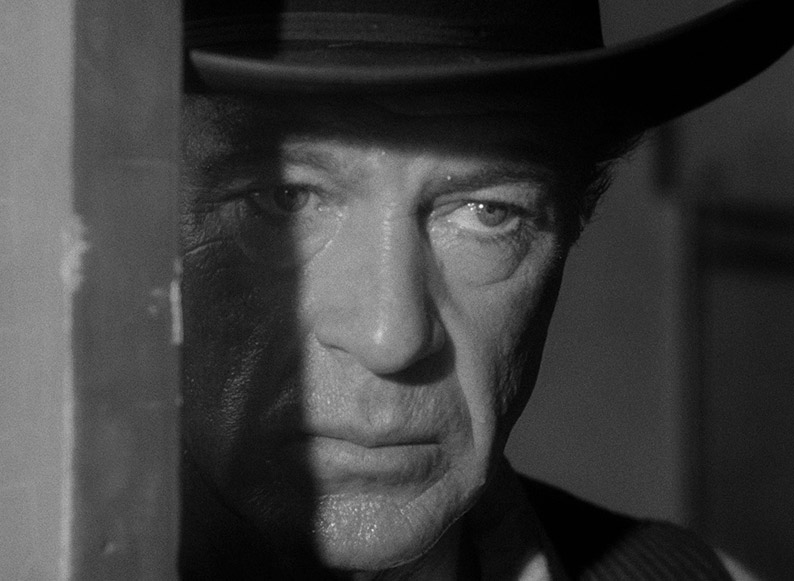
HIGH NOON (Eureka – Masters of Cinema)
Fred Zinnemann’s classic western got luxurious treatment from Masters of Cinema in one of its finest Blu-ray releases of the year, with a sparkling transfer from a new 4K restoration and a fabulous collection of top-notch special features. That alone would be enough to earn a place on my list, but what really tipped the balance was my experience of coming back to the film after a gap of many years and becoming fully aware of just how bold and layered a work it is. It seemed almost as if the process of restoring the picture to its former glory simultaneously lifted a symbolic veil to reveal content that was previously hidden from my formerly younger and more innocent eyes. A magnificent western on a terrific Blu-ray. Enough said.
Blu-ray review >>
THE INCIDENT (Eureka)
Perhaps the year’s most startling rediscovery, Larry Peerce’s extraordinary collision of social drama and thriller was without question the most discomforting film I watched all year, quite an achievement when you consider it was first released back in 1967. Initially playing almost like a socially conscious disaster movie, as a range of characters all heading to the same New York subway train are introduced and economically sketched. The film then shifts gear when the train is boarded by two wild and dangerous youths (terrifyingly played by Tony Musante and, in his feature debut, Martin Sheen), who proceed to intimidate and humiliate the other occupants of the car, almost none of whom seem willing to directly confront them. It’s one of those films, like Narciso Ibáñez Serrador’s Who Can Kill a Child? (1976) and James Landis’s The Sadist (1963), that I can’t believe has flown under my radar for so long and that we can only be grateful to enterprising distributors for helping to resurrect. You also get two excellent commentary tracks (one with director Larry Peerce), a Peerce Q&A and a typically fine booklet. Superb.
Blu-ray review >>
THE LAST MOVIE (Indicator)
Almost the definition of the term ‘difficult cinema’, director/star Dennis Hopper’s much maligned follow-up to the game-changing Easy Rider continues to divide opinion to this day. I’m not for one second going to claim that I don’t have my own issues with the film, yet Hopper does here what few filmmakers are either willing or able to do by risking alienating his audience in pursuit of a singular artistic vision. The result may be uneven, but the high points are so striking and the journey so challenging – in all that is good in that term – that I’ll take it any day over many of the more polished Hollywood products of today. Indicator clearly (and rightly) believed that a prestige release of the film would be embraced by cineastes and gave it the royal treatment, handsomely showcasing a new 4K restoration and backing it with a fine collection special features. Even the packaging of this one made it look more like a box set of Hopper films rather than a single movie, making it a must-have for fans and collectors.
Blu-ray review >>
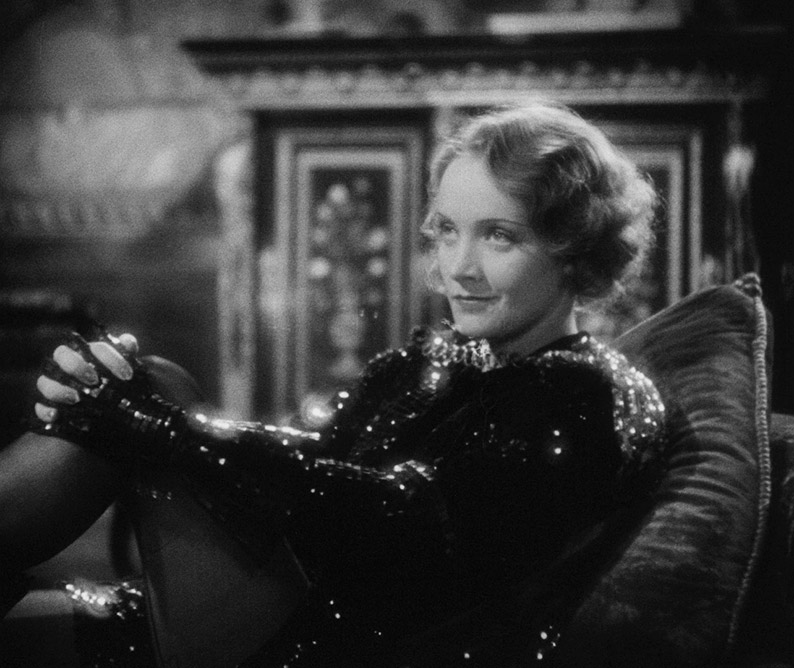
MARLENE DIETRICH & JOSEF VON STERNBERG AT PARAMOUNT 1930-1935 (Indicator)
Another brilliant but time-swallowing box set from Indicator, this superb collection contains all six of the American feature collaborations between German emigres Marlene Dietrich and Josef von Sternberg, the majority of which I’d criminally never seen and most of which I was absolutely blown away by. So entranced was I by the films and the accompanying special features that my original intention to cover each of them with the sort of brevity I have proposed for our ‘shorter’ reviews fell flat on its face. The result was that all other reviews were abandoned for the three solid weeks it took to watch and write about the contents of this set, resulting in a review that ran for over 16,000 words. Even then I have the feeling I had to cut myself short. This is an exemplary release that perfectly illustrates why Indicator came so quickly to be held in such high regard by anyone and everyone with a love for classic cinema.
Blu-ray review >>
OLDBOY (Arrow)
When Arrow announced this special edition of Park Chan-wook’s breakthrough masterpiece Oldboy, I just knew that the timing of the release would make it impossible for me to free up the time required for a comprehensive review. Despite having covered two of the film’s previous DVD releases, the sheer slew of proposed extra features, coupled with the certainty that I’d have plenty new to say about the movie itself after a gap of a few years, would mean that I’d be unlikely to deliver the review by the release date, especially if the review disc arrived only a few days before it. I thus put an advance order in for the retail version of the disc and left it at that. Then things complicated a little. The release date was pushed back, then as far as I can gather a rights issue arose around some of the planned special features, which forced their removal. To compensate those who had pre-ordered the disc, Arrow did something extraordinary and replaced the missing special features with the other two films in Park’s Vengeance Trilogy! Each with its own collection of special features! I was seriously excited but as soon after we posted a story announcing this news we were contacted by dismayed fans of the trilogy, who informed us that this limited edition set had already sold out on pre-order, and when asked about it Arrow confirmed that they were not going to extend its limited run. Fortunately, a second release containing the three films and the special features did eventually follow, the only real change being the absence of the Special Edition’s impressive packaging and physical extras. And that Special Edition really is something, a lovingly put-together collection that’s as close to definitive a release as this Trilogy is like to see on Blu-ray. Great transfers and a warehouse full of fine extras, including the feature-length documentary, Old Days. A marvellous release.
ROBOCOP (Arrow)
One of several releases from Arrow this year (see the For Your Consideration titles below) that demonstrated once again that it could showcase a single film as luxuriously as a multi-film box set collection. I ended up picking this one for the list over a couple of the others listed below in part because I reviewed it and thus spend more time with it, but also because it has a been a favourite film of mine since I first saw it at a London preview screening and the disc is so gorgeously packaged and featured that I occasionally get the urge to pick it up and hug it. You all know the film – and if not, why not? – and it’s handsomely presented here from a lovely restoration, and the sheer volume of special features, both old and new, once again make it likely that this will be seen as its definitive Blu-ray release. The inclusion of physical extras, including a poster and a sticker warning potential thieves that your property is protected by Robocop, help to mark this as a collector’s item.
Blu-ray review >>
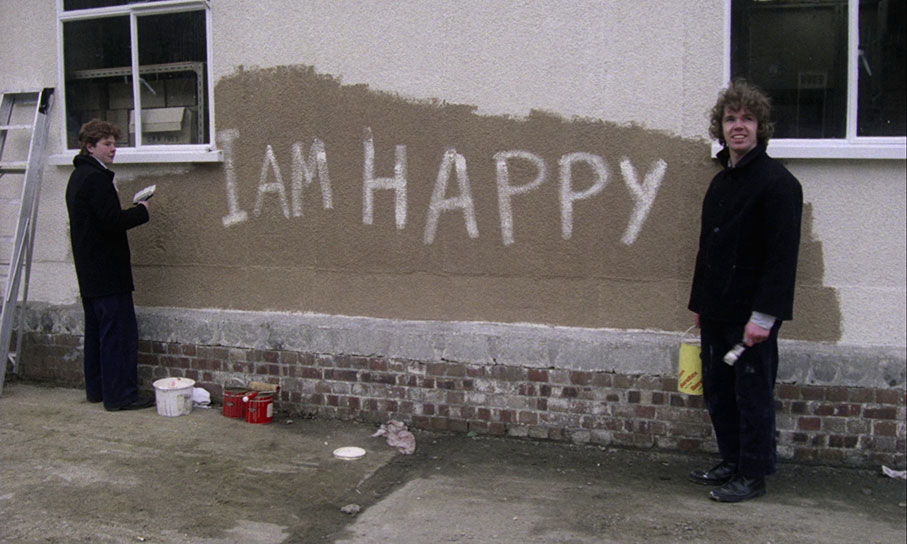
SCUM (Indicator)
We’re taking favourite films again, but this is one I genuinely wouldn’t have predicted would get the Indicator Special Edition treatment, but oh am I happy that it did. Alan Clarke’s still blistering feature remake of his and screenwriter Roy Minton’s banned BBC TV play looks better than I would ever have believed it could on this Blu-ray, and as well as including every archive interview and feature they could lay their hands on, those responsible for this release filmed a sizeable collection of new interviews with cast and crew members, as well as producing a handsome 78-page booklet whose contents make for enthralling reading. All that’s missing is the BBC original, but you can find that in the BFI’s brilliant Dissent & Disruption box set, which should also be considered an essential purchase for Alan Clarke fans.
Blu-ray review >>
UNDER FIRE (Eureka)
In terms of disc content, this is not in the league of some of the above detailed titles, but I’m including it on this list anyway because I love the film and have been waiting an age for it to make an appearance on UK Blu-ray. Being a Eureka title, instead of the bare bones disc I would have expected from a big studio release we got two superb commentary tracks, one featuring director Roger Spottiswoode and the other focussed on Jerry Goldsmith’s wonderful score, plus a brief but still welcome chat with co-star Joanna Cassidy and the usual solid Eureka booklet. Along with Oliver Stone’s Salvador (also available on Blu-ray from Eureka), this remains one of the finest of the ‘correspondent in a war zone’ features of the 1980s, and looks terrific here.
Blu-ray review >>
| for your consideration... |
|
Listed below are some disc releases from the past year that are all equally worthy of your attention. Some I’ve not watched in their entirety yet (I’m talking about the extras rather than the films themselves) while others I liked a lot but they didn’t quite cut it as personal favourites. I have no intention of identifying which titles fall into which of those two categories, but all are damned fine discs.
The Amazing Mr. Blunden (Second Sight)
An American Werewolf in London (Arrow)
Asylum (Second Sight)
Badlands (Criterion UK)
A Blonde in Love (Second Run)
Breakout (Indicator)
The Caretaker (BFI)
The Chant of Jimmy Blacksmith (Eureka – Masters of Cinema)
Cujo (Eureka)
Coming Home (Eureka – Masters of Cinema)
Dave Made a Maze (Arrow)
The Ear (Second Run)
Eating Raoul (Criterion UK)
The Emperor’s Naked Army Marches On (Second Run)
The Exorcist III (Arrow)
The Fate of Lee Khan (Eureka – Masters of Cinema)
Fear & Loathing in Las Vegas (Arrow)
Horror Express (Arrow)
The House That Dripped Blood (Second Sight)
The Invitation(Second Sight)
Ironweed (Eureka)
Journey to the Beginning of Time (Second Run)
Khrustalyov, My Car! (Arrow Academy)
Klute (Criterion UK)
Last Hurrah for Chivalry / Hand of Death: Two Films by John Woo (Eureka)
Laura (Eureka– Masters of Cinema)
My Name is Julia Ross (Arrow Academy)
Nightbreed (Arrow)
90º in the Shade (Indicator)
No Orchids for Miss Blandish (Indicator)
Of Flesh and Blood: The Cinema of Hirokazu Koreeda (BFI)
One, Two, Three (Eureka – Masters of Cinema)
Pinter at the BBC (BFI)
Psych 59 (Indicator)
The Ring Collection (Arrow)
Secret Ceremony (Indicator)
The Snake Pit (Indicator)
The System (Indicator)
Time Without Pity (Indicator)
The Virgin Soldiers (Indicator)
Wheels on Meals (Eureka)
The White Reindeer (Eureka – Masters of Cinema)
|